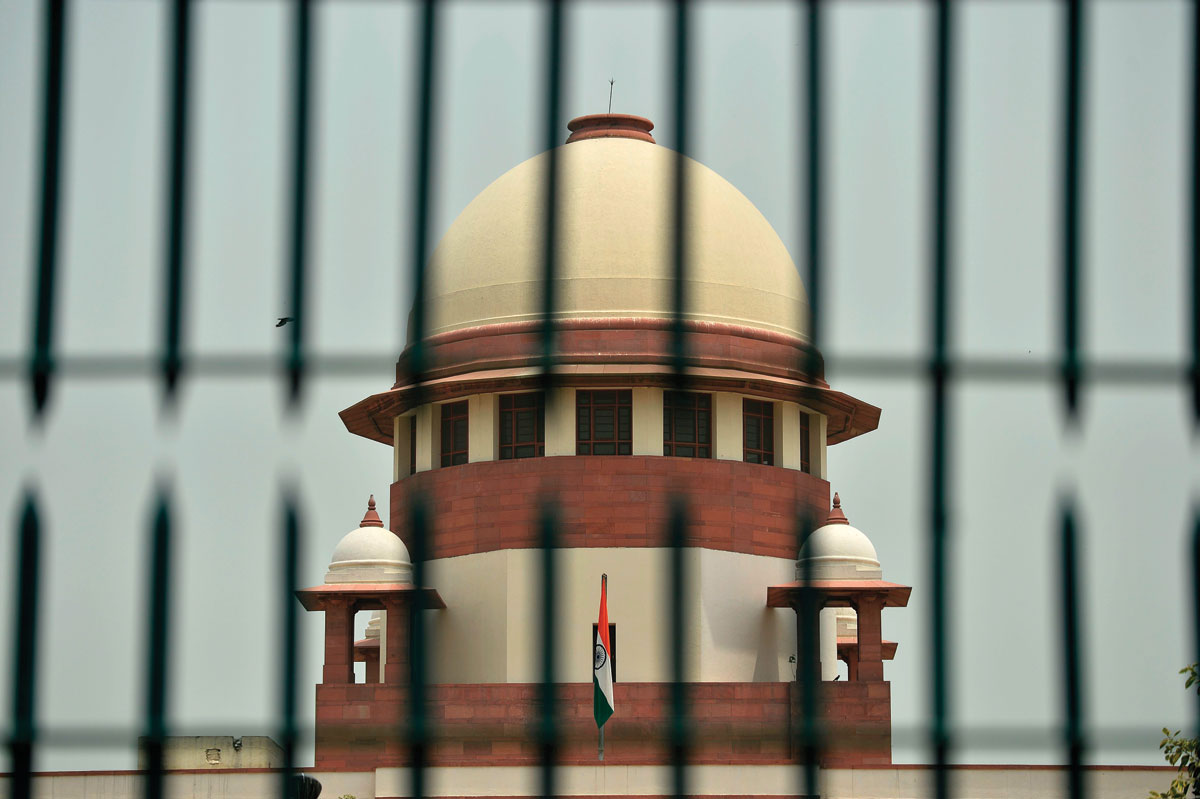India’s Top Court Steps Up to Cleanse Politics, Addressing Ascending Criminalization of Politics
(Above): In this photograph taken on May 26, 2016, the Indian Supreme Court building is seen in New Delhi. (Sajjad Hussain/AFP/Getty Images)
By Priyanka Bhardwaj
In a country that has a long history of a deep nexus between politics and crime, the Supreme Court’s February 13th directive for all political parties to publish names of any candidates with criminal records as also the “justification” thereof for choosing such candidates in at least one local newspaper and one national newspaper, party websites and social media handles, and forwarding this information to the Election Commission of India (ECI) has made for newsy headlines.
The four page judgment passed by a bench of Justices RF Nariman and S Ravindra Bhat specifically states that “winnability” would not suffice as an adequate justification and public admission of this information has to be made within 48 hours of the selection of the candidate, or within two weeks before the first date for filing of nominations, whichever comes first, failure of which shall invite contempt of court.
This order flows from a contempt case filed by Bharatiya Janata Party (BJP) spokesperson Ashiwini Upadhyay against the ECI for failing to take steps to ensure implementation of the 2018 order of the apex court in the Public Interest Foundation versus Union of India case when political parties openly flouted the order by publishing details of candidates with criminal background in “obscure and limited circulation newspapers” and “making the webpages on their websites difficult to access”.
As per Gopal Sankarnarayana, the senior advocate representing the petitioner, the contempt of court as mandated by the court could invite imposition of fines on the erring political parties, or even revocation of the party’s registration, or party leaders facing fines or even jail terms.
The latest order is based on a comparative data analysis of last four General Elections (2004 2009, 2014 and 2019) by Association of Democratic Reforms (ADR) that suggests a phenomenal ascendancy in percentage of criminal politicians reaching Lok Sabha, from 24% to 30%, 34% and 43% (or 233 representatives) respectively, as evidenced from the election affidavits filed by candidates themselves.
Crimes range from proven to alleged ones, in the category of thefts assault of public officers, murder, rape and politically motivated ones, and the report further states that in 2019 general elections the percentage of tainted politicians in the BJP Congress, Janata Dal United, Trinamool Congress and DMK stood at 39, 57, 81, 41 and 43 respectively.
Even in the recently-held Delhi assembly elections, 104 candidates had criminal cases pending against them, whilst 36 had cases of crimes against women, and 4 with hate speech charges pending against them.
Notwithstanding the unresolvable riddle of politics being a function of crime or vice versa, it is a widely acknowledged fact that running political parties and their electoral campaigns require enormous funds thus enlarging the space for “self-financing” candidates over others who are collectively regarded as a drain on the finite party-exchequer.
Abetted with the gradual weakening of the law and order and criminal justice system, in the fiercely contested race to three million political positions in India’s quasi-federal three-tier democracy, comprising the central government (Lok Sabha & Rajya Sabha) positions, state legislative assemblies and the local government bodies (municipal corporations, municipalities, village panchayats, etc.) that entail humongous expenditures, almost all political parties that are now led by either dynasts or dominant personalities, indicative of lack of inner party democracy, “opportunists with deep pockets” manage it to the line of reckoning as being chosen by these parties to be fielded during elections and also easily earning public approval more so in areas where the state’s delivery of services, dispensing of justice and ensuring law and order are in the lacking.
And upon being elected, these “opportunists” also ensure a higher chance of contributing to the wealth of the party and their personal assets, to enlarge their assets and, build “stocks” for “future investment”, all of which impede local development.
A characteristic feature of these winnable candidates is their wealth status reflecting the straight linkages between crime money and electoral success, posing one of the biggest threats to the conduct of free and fair elections in the world’s largest democracy that saw a voter turnout of 67.11% out of approximately 900 million eligible voters in 2019 general elections to 542 constituencies, and also probably bearing upon the under-representation of women in politics.
In the 2014 general elections, 165 re-elected Parliamentarians had an average asset growth by Rs.75, 000, 000 in 2009 to 2014 period and the median wealth of re-nominated candidates in 2019 stood at Rs.43, 400, 000 from Rs.33, 400, 000 in 2014.
Whilst the aforementioned facts and figures make for a case for reforms in electoral financing and bolstering of state capacity, in obligating the political parties to present choices and reasoning to the voters, the apex court aims to affix responsibility on the processes of democracy.
In the recent past the Prime Minister Narendra Modi and head of the largest political party, the BJP, had spoken of the need for a shift to a system of state sponsor of elections as the way out of the quagmire, but as yet it is no less than utopia to expect the political system to uproot the evil that holds sway.
The electoral bond financing system as introduced by the Modi government in 2017, fails in bringing in transparency by allowing names of donors to remain anonymous and only reporting the amount of donation via the banking instrument.
For instance all one learns is that the BJP’s earnings in year ended March 2019 was $399 million (41.7% of its income), more than double of its five main rival parties, and that the Trinamool Congress earned nearly half of its income from electoral bonds in the same fiscal.
An ADR study states that BJP’s income in 2018-019 surged by 134.59%, while the Congress’ income rose by 360.97% and that of TMC’s soared by an incredible 3,628.47%.
Coming to the jurisprudence system, critics have openly pinpointed the similarities of an elitist mindset of the judiciary and the political tarmac to adhere to principles of transparency and the apex court’s failure to review compliance of fast-track courts that had to resolve trials of politicians within a year, thereby compounding its inabilities to decriminalize politics.
Further, the lack of an absolute will to bring in purity in election system is reflected in its non-suspension of the right to stand for elections, not a fundamental right, to tainted politicians when near about 270,000 under-trials languish in jails, their fundamental rights to movement, occupation liberty and a life of dignity held in abeyance, and scores of others facing reasonable restrictions in their exercise of rights of expression and speech, as conferred by Article 19, in the context of safeguarding larger national interests.
As politics and crime remain so deeply symbiotic and there are no incentives for political parties to change their established norm of distributing tickets to those charged with serious crimes, it is for the institutional authority of the Supreme Court to break out of the executive precincts that the political class has always desired to contain it within and truly exercise its contempt power on erring political parties with improved enforcement of improved regulations.


